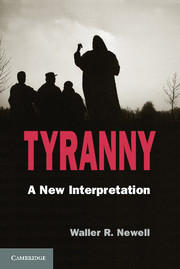Book contents
- Frontmatter
- Contents
- Acknowledgments
- Introduction
- 1 Is There an Ontology of Tyranny?
- 2 The Tyrant and the Statesman in Plato's Political Philosophy and Machiavelli's Rejoinder
- 3 Superlative Virtue, Monarchy, and Political Community in Aristotle's Politics
- 4 Tyranny and the Science of Ruling in Xenophon's Political Thought
- 5 Machiavelli, Xenophon, and Xenophon's Cyrus
- 6 Glory and Reputation
- 7 The Republic in Motion
- Conclusion
- Epilogue
- Bibliography
- Index
7 - The Republic in Motion
Machiavelli's Vision of the New Rome
Published online by Cambridge University Press: 05 May 2013
- Frontmatter
- Contents
- Acknowledgments
- Introduction
- 1 Is There an Ontology of Tyranny?
- 2 The Tyrant and the Statesman in Plato's Political Philosophy and Machiavelli's Rejoinder
- 3 Superlative Virtue, Monarchy, and Political Community in Aristotle's Politics
- 4 Tyranny and the Science of Ruling in Xenophon's Political Thought
- 5 Machiavelli, Xenophon, and Xenophon's Cyrus
- 6 Glory and Reputation
- 7 The Republic in Motion
- Conclusion
- Epilogue
- Bibliography
- Index
Summary
In this chapter, bringing to a conclusion my focus on the conquest of nature as the unifying ontological premise of Machiavelli's political philosophy, I try to show how Machiavelli's point of departure from the ancients over the relationship of virtue to fortune leads him to radically reorient the classical account of the founding of regimes and the prescription for the best regime. Although appearing to follow classical typologies like those of Aristotle and Polybius, at the end of the day, in endorsing the Roman Republic's dynamic imperial expansionism, Machiavelli turns virtually every premise of classical political philosophy on its head, from the pragmatic and psychological to the metaphysical. For, while the classics had maintained that a regime might be perfected insofar as its politics transcended chance and spontaneity in the direction of the permanent unity informing the whole, Machiavelli argues on the contrary that the history of Rome shows how a republic can be perfected by “chance” and “the aid of events.” In Machiavelli's depiction of the progressive historical evolution of the Roman Republic, moreover, we find a prescription that combines what Plato and Aristotle had firmly maintained was not combinable – republican virtue as the basis for imperial aggrandizement.
Some scholars see a sharp distinction between The Prince as a pragmatic guidebook for princes (a job application, in effect, submitted by Machiavelli to a not terribly prepossessing ruler: Tyranny for Dummies: A Guide to Oppression for the Rest of Us!) and the Discourses as containing his deeper and more heartfelt republican convictions, as well as more openly philosophical speculation about fortune and the cycle of human affairs. If that were strictly true, it might appear as if my theme of tyranny should confine itself to The Prince and leave republics aside. There is something to this distinction. But I am going to try to show that the subject matter and intrinsic political teachings of the two books converge to a very large degree, bearing in mind that just as an individual prince can be a tyrant, so, too, can a republic or any self-governing community that is also imperialistic. As we observed in Chapter 4 in this regard, Thucydides presents Pericles as reminding the Athenians that, while they are a self-governing democracy internally, they are a “tyrant city” in the eyes of their allies and victims abroad.
- Type
- Chapter
- Information
- TyrannyA New Interpretation, pp. 345 - 432Publisher: Cambridge University PressPrint publication year: 2013



